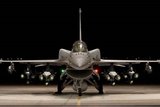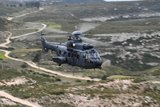German industry teams up to develop sensors for FCAS fighter
Four German companies will work on technology demonstrators for key sensor elements of the FCAS programme. (Image: Hensoldt)
A German consortium, FCMS, consisting of Hensoldt Sensors, Diehl Defence, ESG and Rohde & Schwarz has been commissioned with development of core elements of the sensor network for the FCAS sixth-generation combat aircraft programme, it was announced on 7 February.
'The next-generation air combat system requires an intelligent approach to a platform-independent, networked mission system, high-end sensors and AI-based data analysis,' said Hensoldt CEO Thomas Müller as spokesperson for FCMS. 'This is where German industry with the FCMS consortium will make a significant contribution.'
As part of the broader FCAS effort, FCMS will develop technologies for individual sensors as well as an innovative system of networked sensors. By 2025, technology demonstrators will be created to show the possibilities of the new technologies and a platform-independent collaborative solution for sensors.
On this basis, development will continue in further FCAS demonstrator phases to provide sensor systems for the various platforms of the FCAS network.
In Demonstrator Phase 1B, Hensoldt will work on sensor technology and data fusion as well as electronic warfare and networking, and Diehl Defence on an imaging target locator and targeting sensor suite plus remote carrier concepts. ESG meanwhile will tackle sensor architecture and resource management, as well as networking, simulation and flight test, with Rohde & Schwarz providing resilient air and ground networking as an enabler for the FCAS Combat Cloud.
Related Programmes in Defence Insight
More from Air Warfare
-
![Saudi Arabia air report: The world’s fourth-largest UAV market seeks to strengthen domestic industry]()
Saudi Arabia air report: The world’s fourth-largest UAV market seeks to strengthen domestic industry
With $9.18 billion in uncontracted programmes — including a potential multi-billion-dollar MQ-9B deal — Saudi Arabia’s UAV sector is poised for significant further growth and industrial expansion.
-
![AI mission-autonomy software integration and partnerships see progress across CCA efforts]()
AI mission-autonomy software integration and partnerships see progress across CCA efforts
The successful integration of third-party mission autonomy in the US Air Force’s CCA programme and movement on Helsing’s Europa CA-1 timelines mark key milestones in the development of uncrewed aerial capabilities.
-
![Airbus Helicopters is deepening its European reach as NATO orders climb]()
Airbus Helicopters is deepening its European reach as NATO orders climb
Airbus has delivered more than 2,000 helicopters to nations across Europe, and continues to solidify its position at the heart of the region’s defence industrial base.
-
![Singapore Airshow 2026: Rafael highlights tailored effector solutions for different operational needs]()
Singapore Airshow 2026: Rafael highlights tailored effector solutions for different operational needs
Shephard spoke with Rafael’s CEO about the company’s effector offerings as well as his perspective on one-way attack drones.






















